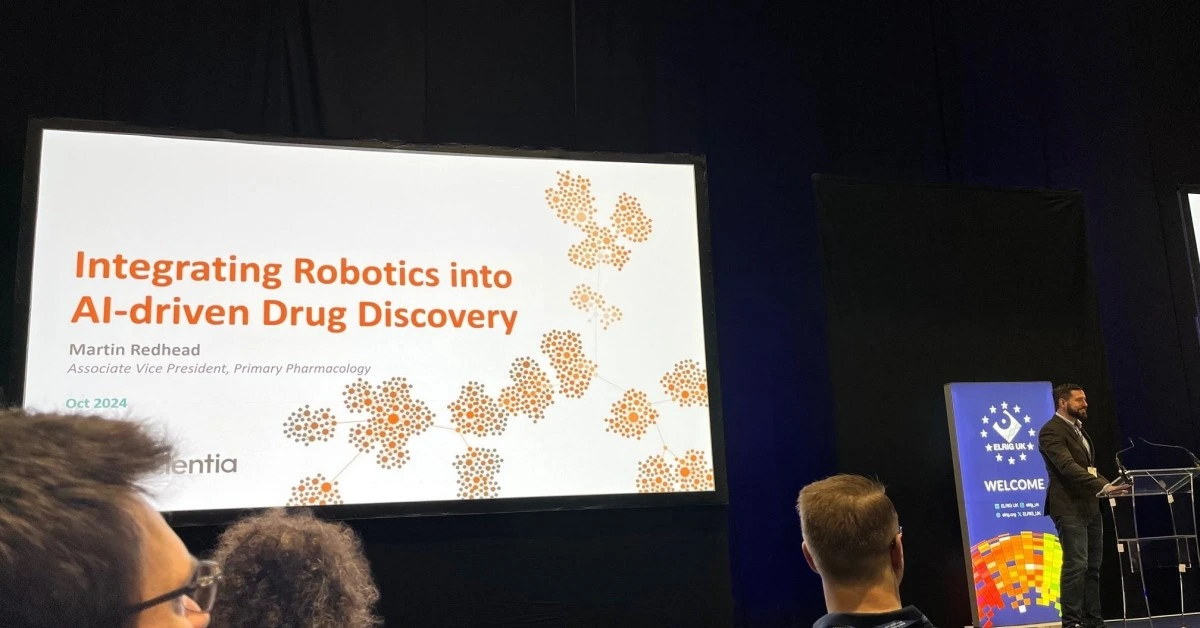
UNITED KINGDOM –Exscientia, a pioneer in AI-driven pharmaceutical technology, presented its latest advancements in drug discovery at the ELRIG Drug Discovery 2024 conference in London.
The company emphasized the significant impact artificial intelligence (AI) is having on streamlining the drug development process.
Exscientia is at the forefront of integrating robotics and AI into their workflow, enabling faster, more efficient discovery of new drug molecules.
By automating key processes, the company is setting new benchmarks for productivity in the pharmaceutical industry.
The company, which operates a state-of-the-art robotics laboratory in Oxfordshire, UK, is setting new standards in the development of novel drug molecules.
These innovations aim to dramatically enhance efficiency, productivity, and cost-effectiveness in the pharmaceutical industry.
The AI-driven transformation in drug discovery
Pharmaceutical companies are increasingly adopting AI algorithms to design new drug molecules, and Exscientia has been at the forefront of this revolution.
At the ELRIG conference, Martin Redhead, Exscientia’s Associate Vice President, shared how their AI-powered platform is transforming the entire end-to-end drug discovery process.
According to Redhead, the use of AI in drug design has led to a significant increase in the number of molecules entering clinical trials, with a success rate of 80% in Phase I trials—far exceeding the industry average of 15%.
Exscientia’s system is not only automating traditional processes but also expanding the range of assays used to better understand complex biological targets and mechanisms.
Unlike high-throughput screening (HTS), which requires significant human intervention, Exscientia’s robotic system can autonomously manage multiple assays, generating vast amounts of data that feed into AI systems, ultimately optimizing drug discovery.
Cutting-edge robotics lab in Oxfordshire
Exscientia recently opened a 26,000 square-foot robotics lab in Oxfordshire, where automated systems are handling much of the drug development process.
In the last five years, the company has successfully designed four molecules with minimal human intervention. These molecules offer therapeutic benefits across various medical conditions.
However, the company emphasized that AI and robotics are not intended to replace human jobs but to enhance them.
Redhead reassured those concerned about AI displacing jobs, stating, “AI will make people more efficient and better at their jobs.”
Collaborations and investment growth
The rise of AI-led drug discovery has attracted considerable interest from investors and major pharmaceutical companies.
For instance, in 2021, Bristol-Myers Squibb signed a US $1.2 billion deal with Exscientia to develop small molecules using AI.
Across the healthcare industry, the AI market is projected to grow exponentially, with analysts estimating its value to reach $908.7 billion by 2030, according to GlobalData.
Exscientia’s revolutionary approach
Exscientia’s innovative approach to drug discovery centers around its Design-Make-Test-Learn (DMTL) cycle, which accelerates the process of developing new therapies while cutting costs.
Utilizing generative AI, the company designs potential drug candidates in silico, dramatically reducing the need for expensive and time-consuming laboratory experiments.
According to David Hallett, Exscientia’s interim CEO and Chief Scientific Officer, “We use generative AI to solve for efficiency and effectiveness.
By predicting the molecular features of a safe and effective drug in silico, we minimize the number of costly experiments.”
This approach allows Exscientia to create drug candidates that meet specific medical needs, all while optimizing the safety and effectiveness of these compounds.
AI-enhanced efficiency and cost reduction
Traditionally, drug discovery can take up to 15 years and cost over US $2 billion, with an alarming failure rate of 90–96%.
Exscientia’s AI-driven platform, built on Amazon Web Services (AWS), accelerates this process by as much as 70%, while reducing capital costs by 80%.
The company’s system is designed to “iron out” potential chemical liabilities before a drug candidate ever reaches clinical trials, ensuring a higher likelihood of success.
Six AI-designed molecules from Exscientia have already entered clinical trials, underscoring the company’s ability to bring promising new therapies to market at an accelerated pace.
As the AI and robotic systems continue to evolve, Exscientia anticipates further breakthroughs in drug discovery and a faster, more cost-effective pipeline for developing lifesaving medicines.
XRP HEALTHCARE L.L.C | License Number: 2312867.01 | Dubai | © Copyright 2025 | All Rights Reserved